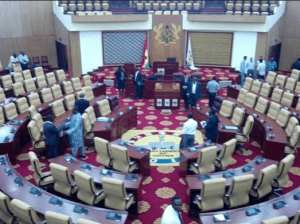Ghana Parliament sharply divided on merits of 2016 Budget
 Even before the debate commenced, there were disagreements over the budget document, with the minority insisting that what was before them was technically different from the rendition of the Finance Minister.
Even before the debate commenced, there were disagreements over the budget document, with the minority insisting that what was before them was technically different from the rendition of the Finance Minister.
The House was thus adjourned for about 10 minutes and the issue was resolved by the leadership of both sides.
The 2016 Budget, themed, “Consolidating Progress towards a Brighter Medium Term”, was delivered in Parliament on November 13, 2015 by Mr Seth Terkper, the Finance Minister, with the fiscal policy targeted at maintaining fiscal discipline.
It also has a projected economic growth of 5.4 per cent, and it is expected to reign in some GHC38 billion in revenues. The plan will also leverage on gains made in 2015 to reduce inflation to 10 per cent, with a deficit target of 5.3 per cent of GDP.
The debate was characterised by the suspicion that the Minority intended to stifle the Government’s business because the President had recently said on a political platform that they were sleeping on the job.
However, the First Deputy Speaker, Ebo Barton-Odro, in good time, deftly managed to get both sides to make their points without acrimony.
While the Majority touted the budget statement as a visionary plan that would put the economy on the path to growth and prosperity, the Minority maintained that the fiscal policy was detrimental to the country’s economic prospects for next year and it did not inspire hope for the many struggling Ghanaians.
They thus described the budget as a “toxic mix of incompetence and mismanagement”, which they believed would not address the present economic malaise of Ghana.
James Klutse Avedzi, Parliament’s Finance Committee Chairman, said the budget statement was a realistic fiscal policy that would address the country’s present economic circumstances and praised the Government for a holistic move to improve revenue mobilization and efficiency in tax administration.
He noted that with the macro economic outlook for 2016, growth targets would result in a 5.4 percent in GDP growth, which was far better than the projected global average economic growth of 3.1 per cent.
Mr Avedzi, who is also the MP for Ketu North, said the budget as was presented by the Minister, showed that the Government was determined to maintain a strict fiscal discipline through the prudent measures enumerated in the document in order not to have a budget overrun that would create a higher deficit.
“Government would resist all attempts to have a budget overrun to avoid a higher deficit,” he said
He, however, urged the government to manage the public payroll efficiently in order to contain expenditures that could lead to budget overruns, and it should also work hard to meet the targets set in the budget.
Dr. Mark Assibey-Yeboah, the member for New Juaben South, for his part, said the budget was deficient in bold initiative to address the high cost of living, graduate unemployment, persistent energy crisis, among other challenges.
“Clearly, the economy is sick,” he opined. “We have had two successive growths of 4.0 last year and 4.1 this year. A growth rate of 4.1 per cent is not taking us anywhere. Next door la Cote d’Ivoire, after 11 years of war, has grown their economy by nine per cent.”
“Where did we go wrong?” he asked.
He said sectors of the economy that employed a lot of people had not recorded significant growth, thus leading to record unemployment and job cuts, and challenged the government to take critical steps to turn things around next year.
Dr Assibey-Yeboah also tasked the Government to control the double-digit inflationary trend that had seen no reduction in the past 36 months.
He argued that the country’s neighbours who were less endowed were recording single-digits inflation, with sub-Saharan inflation hovering around 6.9 per cent.
“The cost of living is so high that even church offerings are going down,” he claimed. “Even funeral donations are going down,” he said.
Haruna Iddrisu , the Employment and Labour Relations Minister, said although the government had borrow substantially, the claim that those funds were consumed was not true because the loans were utilised for infrastructural development across the country, which was evident to all.
“Yes we have borrowed as a government, but we borrowed to develop the infrastructure of the country to facilitate economic growth,” he said.
He said the rural electrification project, the Kasoa and Circle Interchange, gas infrastructure, Ridge Hospital, among others, were all justifications of the borrowing.
He said the government was going to establish an EXIM Bank to support export because the bane of the growth of the Ghanaian private sector was access to credit and the cost of credit.
“We are committed, as a government, to growing the private sector to ensure that they have access to cheap credit,” he said.
Paapa Owusu Ankomah, the MP for Sekondi, said a budget before an election should give hope to the people. “But this budget does not give hope for the unemployed, students, the poor and underprivileged.”
“This budget does not include innovations to take the economy out of decline…government is sleepwalking. There is need for government to take strong measures to arrest the decline of the economy,” he said.
Source: GNA
